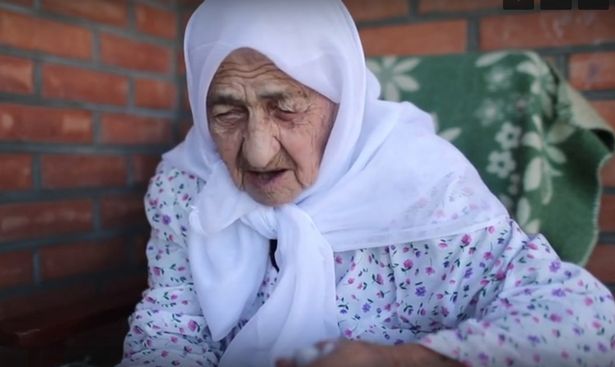A woman believed to be the oldest person to have ever lived has died aged 129.
Koku Istambulova, a survivor of Stalin’s repressions, would have turned 130 in June, according to accepted pension records in Russia.

She was older than a woman listed in the Russian Book of Records who died last month supposedly aged 128, officials believed.
Koku made headlines last year by saying she had never lived a single happy day in her long life.
Her grandson Iliyas Abubakarov said she had supper as usual on Sunday, January 27 at her village home in Chechnya.
“She was joking, she was talking,” he said.
“Then she suddenly felt unwell, she complained of a chest pain.
“We called the doctor, we were told that her blood pressure had dropped, and injections were made.
“But they failed to save her.
“She died in a quiet way, fully conscious, praying.”
She has been buried in her home village Bratskoe, survived by five grandchildren and 16 great grandchildren.
A Muslim who was born before the last Tsar Nicholas II was crowned, she outlived the Soviet Union by a generation, according to her internal Russian passport.
Her date of birth was claimed to be 1 June 1889 – when Queen Victoria was on the throne in Britain.
But her passport gave only a year of her birth, not the exact day and month.
In extraordinary and moving testimony broadcast last year she spoke emotionally of the appalling day her native Chechen people were deported en masse by Stalin to the steppes of Kazakhstan 75 years ago.
She told how people died in the cattle-truck trains – and their bodies were thrown out of the carriages to be eaten by hungry dogs.
If her age was correct, Koku was 54 at the time, having earlier lived through the coronation of the last tsar Nicholas II two days before her 7th birthday – and his toppling when she was 27.
“It was a bad day, cold and gloomy,” she said of the February morning in 1944 when the entire entire nation was banished from their mountain homeland in the Trans-Causacus.
“We were put in a train and taken … no one knew where.
“Railway carriages were stuffed with people – dirt, rubbish, excrement was everywhere.”
Stressing the cruelty of Stalin’s action, she told journalists determinedly in her native Chechen language: “Write that – there was excrement in the carriages.
“We were not allowed [to go] anywhere.”
Young Caucasus girls died because from the rupturing of their bladders – they were ashamed to go to the toilet in crowded stinking the crowded trains.
Older women tried to crowd round them to stop their embarrassment as they relieved themselves.
Yet there was worse.
“On the way to our exile, dead bodies were just thrown out of the train,” she said.
“Nobody was allowed to bury the dead.
“Corpses were eaten by dogs.
“My father-in-law was thrown out of the train in this way.”
A paranoid Stalin had alleged the Chechens were collaborating with the Nazis.
“We were told that we were bad people and that’s why we had to leave,” she said.
Before the war, she recalled “scary” Nazi tanks passing her family home.
She suffered devastating personal bereavements in her Kazakh hell – her two sons both perished in the harsh conditions.
“There were no doctors, no-one to treat them,” she said.
“My younger boy came down with something and passed away really quickly.
“Such things happened in every family.
“When women gave birth children often died because there were no obstetricians, only neighbours and friends.”
Weeping the old lady said: “I only kept my daughter Tamara.”
She was exiled in Kazakhstan for 13 years then, after Stalin’s death, people were allowed to return to their homeland.
When she got back, many houses had been grabbed by incoming Russians – so she set to work building her own home, complaining her husband was “too lazy” for the work.
She conceded that despite her earlier claim, the day she moved into her own house, built with her own hands, after returning from internal Soviet exile was “happy”.
“I built it myself, the best house in the world,” she said.
“I lived there for 60 years.”
Asked about the secret of going life, she previously said: “It was God’s will.
“I did nothing to make it happen.
“I see people going in for sports, eating something special, keeping themselves fit, but I have no idea how I lived until now.”
Her recipe for a long life was fermented milk, but she shunned meat and soup.
She asked: “Why did Allah give me such a long life and so little happiness?….
“I would have been dead long ago, if not for Allah who was holding me in his arms.”
Koku said: “It is hard to live when all who remembered you died long ago.
“And it is very scary to die, however old you are.”
The oldest documented human was Jeanne Calment, from France, who lived 122 years, 164 days, dying in 1997.
French scientists have dismissed a recent claim from Russian researchers who argued she assumed the identity of her dead daughter and was not as old as records show.
Here is a video of her on her 129th birthday.












